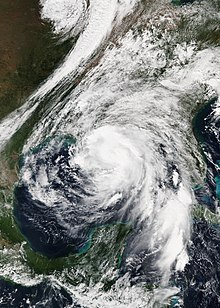 Hurricane Nate at peak intensity approaching Louisiana on October 7 | |
| Meteorological history | |
|---|---|
| Formed | October 4, 2017 |
| Extratropical | October 9, 2017 |
| Dissipated | October 11, 2017 |
| Category 1 hurricane | |
| 1-minute sustained (SSHWS/NWS) | |
| Highest winds | 90 mph (150 km/h) |
| Lowest pressure | 981 mbar (hPa); 28.97 inHg |
| Overall effects | |
| Fatalities | 48 |
| Damage | $787 million (2017 USD) |
| Areas affected | Jamaica, Costa Rica, Central America, Cayman Islands, Cuba, Mexico, East Coast of the United States, Atlantic Canada, St Pierre and Miquelon |
| IBTrACS | |
Part of the 2017 Atlantic hurricane season | |
Hurricane Nate was a deadly and destructive tropical cyclone which was the costliest natural disaster in Costa Rican history. An unusually fast-moving tropical cyclone, it caused severe flooding in Central America, leading to widespread destruction and casualties, during early October 2017, before making landfall on the US Gulf Coast. The fourteenth named storm and ninth hurricane of the extremely active 2017 Atlantic hurricane season, Nate originated from a broad area of low pressure over the southwestern Caribbean on October 3. The disturbance moved northwest, organizing into a tropical depression the next day and attaining tropical storm intensity early on October 5. The storm made landfall in Nicaragua that same day and continued into Honduras with little change in strength. Nate began steady intensification over the warm waters of the northwestern Caribbean Sea shortly thereafter. It attained hurricane strength while moving through the Yucatán Channel early on October 7, attaining peak winds of 90 mph (150 km/h) in the central Gulf of Mexico later that day. Early on the next day, Nate made landfall near the mouth of the Mississippi River in Louisiana. After crossing the marshland of the Mississippi Delta, it made its second U.S. landfall[1] near Biloxi, Mississippi early on October 8, causing a storm surge to flood the ground floors of coastal casinos and buildings, as well as causing rip currents, hurricane-force winds, and beach erosion.
Moving northwestward at 29 mph (47 km/h), Nate was the fastest-moving tropical system ever recorded in the Gulf of Mexico. It is also the fourth Atlantic hurricane of 2017 to have made landfall in the United States or one of its territories; such a quartet of landfalls has not occurred since 2005. In addition, Nate was the first tropical cyclone to move ashore in the state of Mississippi since Hurricane Katrina.[2]
A total of 48 deaths were attributed to Nate: 16 deaths were counted in Nicaragua, 14 in Costa Rica, 5 in Guatemala, 7 in Panama, 3 in Honduras, 1 in El Salvador, and 2 in the United States.
- ^ Cite error: The named reference
ABC8was invoked but never defined (see the help page). - ^ "Nate slams Mississippi as the 4th hurricane in an extraordinary year to make landfall in the U.S." Archived from the original on October 16, 2017. Retrieved October 9, 2017.